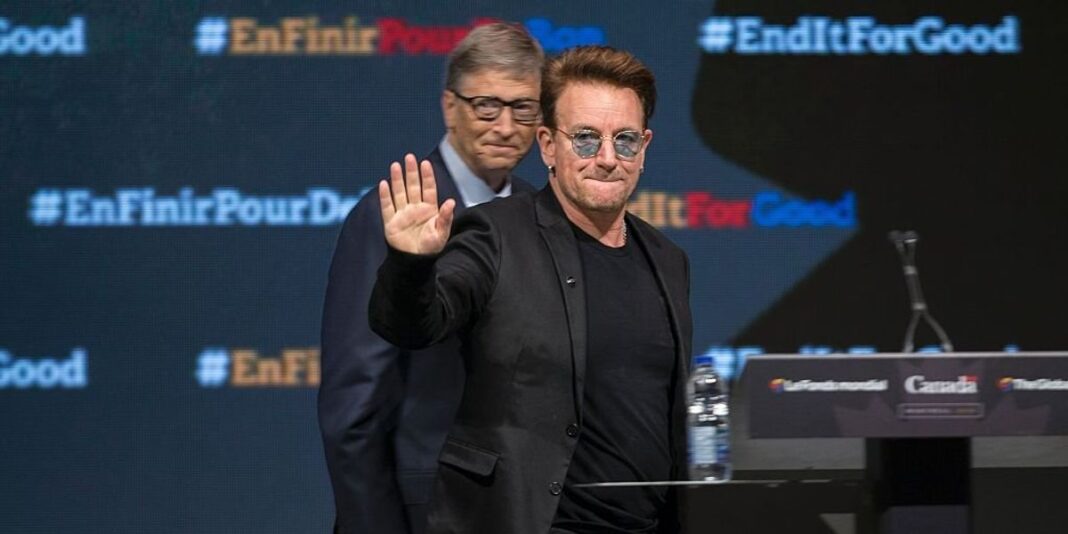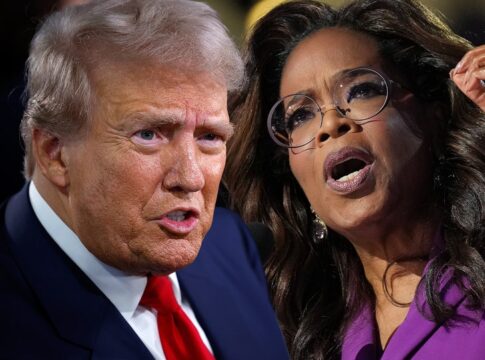U2 is on a winning streak.
Last spring, the Irish rockers wrapped up a wildly popular, 40-night residency at the Sphere in Las Vegas; the $244.5 million in ticket sales made it the fourth-highest-grossing residency of all time. And fans who missed out on seeing the band live are flocking to the new “immersive concert film” recreating the spectacle.
As my father, a dyed-in-the-wool working-class Irishman, once said, ‘Sure, this is a fella who wears sunglasses indoors.’ Indoors!
After almost half a century, the quartet from Dublin is bigger than ever, at least in America.
Back home in Ireland, the vast majority couldn’t give a toss. Why? In one word: Bono.
Let me explain.
You see, Ireland is a place where humility isn’t just admired — it’s expected. Praise makes us squirm, and there’s almost a national dyslexia when it comes to compliments. We show love by jabbing each other with witty (and not-so-witty) remarks. That’s our thing. Compliments are like kryptonite, and boasting is met with severe backlash.
For years, Bono — whose real name is Paul David Hewson — has been seen as someone who believes he’s better than everyone else. As my father, a dyed-in-the-wool working-class Irishman, once said, “Sure, this is a fella who wears sunglasses indoors.” Indoors! Ireland is a place where you’re more likely to encounter an extraterrestrial than a ray of sunshine.
Sanctimonious songsmith
Bono’s involvement in politics and humanitarian work is, without question, admirable. From championing debt relief for developing nations to raising awareness about the HIV/AIDS crisis in Africa, he’s done more good than most rock stars ever dream of.
But when you’re at a U2 concert and Bono starts lecturing the masses, it comes off as pretentious and preachy. I’ve been to a number of the band’s shows, and countless times, Bono has interrupted the flow of the music to deliver impassioned speeches about love, togetherness, and the world’s woes.
Now, I get it — these are important topics. But there’s a time and a place for everything.
Picture a typical U2 show in the late 2000s. It’s an hour or so in, and the band has yet to play classics like “With or Without You” or “Sunday Bloody Sunday.” The anticipation is electric as Bono launches into a long monologue about his close friend Desmond Tutu.
Yes, Tutu was a great man, a giant in the fight against apartheid. But most people there had no idea who he was. Moreover, they hadn’t come for a talk on social justice. They’d shelled out a hefty sum to see a rock show, not to hear about the miracles performed by the late, great bishop and theologian. But that’s exactly what they got.
That’s Bono, though — a man with a cause, always. In America, people might admire that, but in Ireland, we just roll our eyes and snicker.
Separating Hewson from the herd
It’s crucial to separate Bono from U2, just like it’s crucial to separate Xi Jinping from the people of China. U2, at its core, is a great band — no question about it. U2 has given us some great albums, from the raw power of “The Joshua Tree” to the experimental genius of “Achtung Baby.”
The band’s other members seem like genuinely decent guys. I’ve exchanged a few words with the Edge and Larry Mullen in the past, and both came across as down-to-earth, humble, the kind of blokes you’d grab numerous pints of Guinness with.
But Bono, despite what seem like good intentions, has become a kind of lightning rod for criticism in Ireland. It’s not that he’s a bad guy — by most accounts, he’s actually all right. But the damage is done. The impression has already been set in stone.
Having notions
In Ireland, once we’ve made up our minds, it’s almost impossible to shift the consensus. Along with being practically allergic to praise, we’re a stubborn people. Even when presented with solid evidence, we dig in our heels and stick to our convictions. This is not logical, I know. But it’s the way things are.
So while Bono’s sermons about world peace and love may inspire in other parts of the globe, back home in Ireland, they’ve only served to reinforce a long-standing perception — specifically that the 64-year-old takes himself way too seriously.
Recently, a phenomenal Irish musician by the name of Dermot Kennedy sat down for an interview with comedian Theo Von. At one point, their conversation hit on something deeply Irish: the idea of “having notions.”
In Ireland, to “have notions” is to think too highly of yourself — to be full of conceit or arrogance or, as we say, to have a big head (ceann mór,pronounced like “kyan more”). It’s a concept that’s ingrained in our culture, where humility is paramount and anyone who deviates from it becomes an immediate target for criticism and relentless ridicule. And Bono, fairly or unfairly, fits the bill.
Et tu, Conor?
Another man who perfectly embodies the “notions” label is Conor McGregor, someone I’ve discussed in detail before. His recent announcement that he will run for president of Ireland in 2025 should be viewed for exactly what it is — a shameless publicity stunt. McGregor argues that he’s the “only logical choice,” but most people with a functioning brain, something the Dubliner appears to lack, would disagree.
The Irish presidency is a largely ceremonial role, much like the British monarchy. The president has no real legislative power — it’s an ornamental position meant to represent the nation, not shape its policies. McGregor’s entry into this race won’t change that.
Even for a symbolic position, McGregor’s qualifications fall short. His UFC career is spiraling, and this presidential bid reeks of desperation to stay in the spotlight. He’s not a politician; he’s not a statesman — he’s an opportunist. His history of violent outbursts and incoherent public rants, including assaults on fellow Irish citizens, hardly makes him a fitting figure to represent Ireland on the world stage.
Ireland faces real, pressing issues: housing shortages, a crumbling health care system, rising violent crime, and economic uncertainty. None of these are problems McGregor is remotely qualified to address. His bluster and bravado may have won him fights in the octagon, but they won’t fix the country’s mounting crises.
In fact, his bid risks turning the presidency into a sideshow, distracting from the serious work needed to solve Ireland’s problems. But he doesn’t seem to care. This is the danger of being consumed by “notions” — it can drive the rational to irrationality, the once-discerning into dangerously delusional territory.
Both Bono and McGregor have developed larger-than-life personas that have ultimately distanced them from a nation that values humility above all else. They once, many moons ago, recognized the importance of staying in their respective lanes. Those days, however, appear to be long gone.




